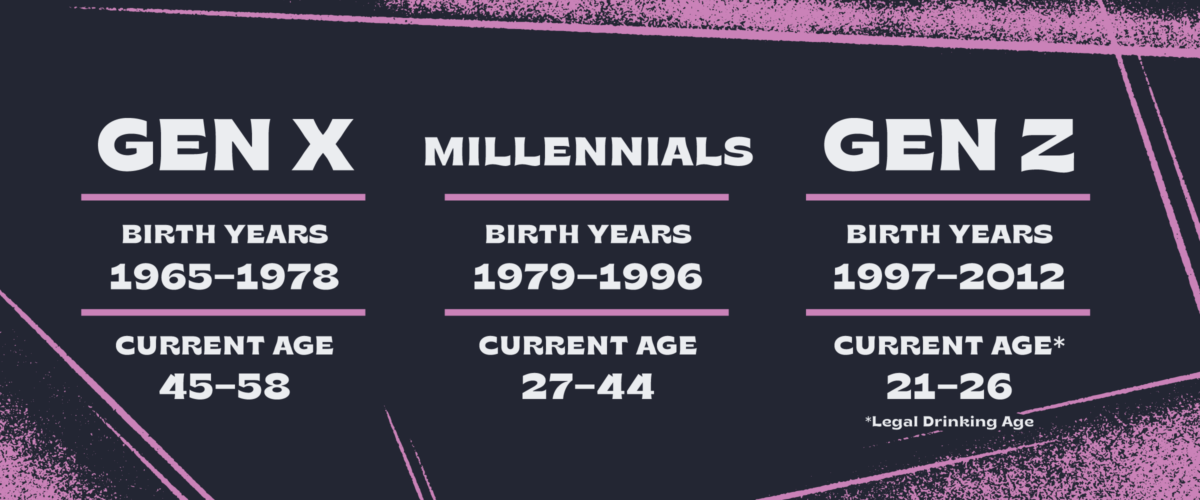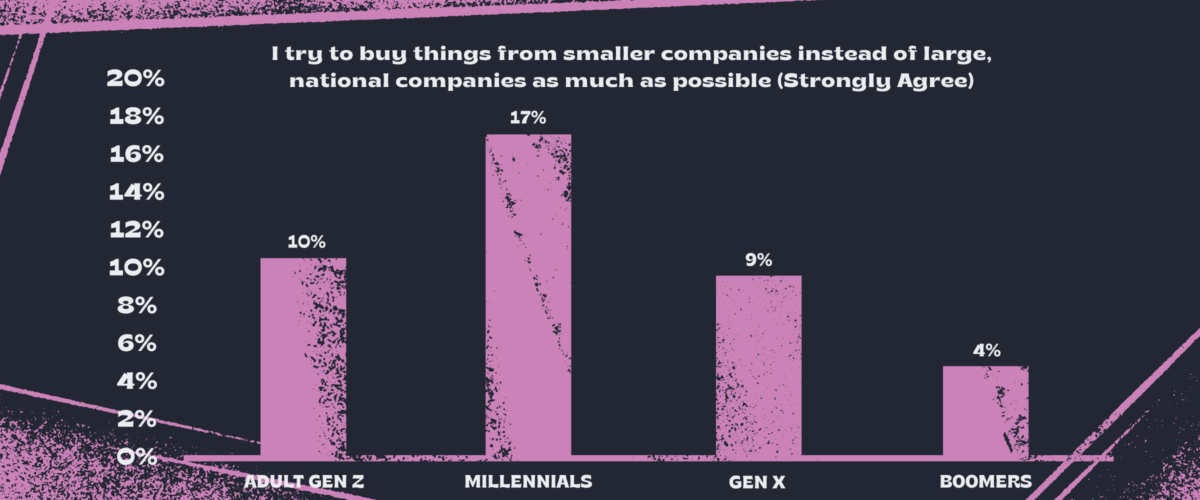Resources
Does Gen Z drink?
Exploring how Gen Z’s values and world view shape their relationship with alcohol (or lack thereof?)
There’s an arms race happening in the Bev Alc today industry to understand, segment and court, legal drinking age (LDA) Gen Z drinkers.
But with as much focus as there is on defining Gen Z’s values and purchasing habits, there’s a lot that we actually don’t know about them.
The oldest members of this cohort are only 21–26 years old today, so we don’t have broad data on their drinking preferences. And even then, only a small percentage of this group has entered their first “real” job and started to form what could become long term habits.
We know that they’re the most racially and ethnically diverse cohort in history. And we know they’ve never known a world without smartphones and social media. But when it comes to alcohol consumption, things get murkier.
Depending on what you read, Gen Z is either the most sober generation ever (the alcohol industry is doomed!). Or, they drink just as much as Millennials before them. Or, they’re somewhere in the middle (perhaps Cali Sober?).
In an attempt to cut through the bias and headlines, we sat down with Mike Kallenberger, a seasoned beer consultant and marketing expert who has spent the last several years helping some of the biggest beer brands in the world adapt to changing consumer trends.


Hi, Mike. Please start by introducing yourself and giving us a rundown on your history in the beer industry.
 Mike
Mike
Hi, Isaac. I’ve been in the beer industry for over forty years now.
My focus has always been consumer insights and brand strategy. I spent a lot of that time with Miller Brewing, but for the last ten years I’ve been with First Key Consulting as Senior Advisor, Marketing Insights and Strategy. In that role I’ve worked with breweries of all sizes, particularly independent craft brewers. I’ve also been studying transitions between generations and their impact on both beer and culture for most of that time.

We’ll dive into specifics here shortly, but can you lead us off by outlining what we know about Gen Z in general and their relationship with alcohol in particular?
 Mike
Mike
I think Gen Z is in some ways still figuring out their relationship with alcohol. With the caveat that generalizations must always be taken with a grain of sale, many Gen Zers deal with a lot of anxiety and stress, and as such staying in control is important to them—not just when it comes to alcohol, but in life in general.

We’ve found equally credible sources claiming that Gen Z is either the most sober generation in modern history, or that they’re drinking alcohol at rates that are directly in-line with the young, legal drinking age (LDA) Millennials that came before them. Do you have any data to support either of these narratives?
 Mike
Mike
I don’t have “apples to apples” data, but there’s enough data available to convince me they are drinking significantly less than previous generations at the same age. They’re also less likely to say that beer, wine, or liquor is “in” than previous generations.

For Gen Z folks who do drink alcohol, do we have an idea of how their preferences break out across the various categories (beer, wine, spirits, RTD/FMB)?
 Mike
Mike
RTDs and FMBs are clearly on the rise in this generation, although the totals are clearly still behind those for beer, wine, or spirits. They claim to drink less of all three than do Millennials. But they do seem to be continuing the Millennial-led trend of drinking less beer relative to spirits.

Where does cannabis factor into this picture? Does Gen Z consume more or less cannabis than Millennials? And for Gen Z folks who enjoy cannabis, does this replace alcohol entirely or augment it? Should breweries view cannabis as an opportunity or a threat?
 Mike
Mike
There are conflicting reports on cannabis-related questions. I’m not sure about Gen Z’s consumption relative to that of Millennials, but it will clearly be growing. Some studies have found cannabis replaces some alcohol consumption and others that have concluded it complements drinking. It almost certainly does both under different circumstances.

Build a stronger brand.
Sell more beer.
Join 7,500+ other beer industry folks and sign up for CODO’s monthly Beer Branding Trends Newsletter.

Beer Branding Trends 2.0

Most prominent Legal Drinking Age (LDA) demographic age ranges.

Let’s talk about what we know about Gen Z’s values and how that informs their purchasing decisions.
Millennials were a big driver of the ‘buy local’ ethos that drove the Craft Beer boom. If I can editorialize for a moment, I think that this was a reactionary movement against growing up watching Big Box stores pushing out smaller operators, seeing how the 2008 financial meltdown and subsequent bank bailouts shook out as well as an overall wish to feel some connection to the things we buy.
(Assuming you agree with this…) does any of that apply to Gen Z? This cohort grew up with Amazon Prime shipping, and an already established local movement.
Does Gen Z place any weight on shopping locally or with smaller companies?
 Mike
Mike
Buying from companies that support their local communities is important to Gen Z, but the key word there is “support.” Just being physically located down the block doesn’t motivate Gen Z to buy from a company in the same way it may have with Millennials. Gen Z wants to know you’re involved with and support the community through investment of time and money. I’ve been saying they want companies to be “proactively local.”

One of the prevailing stereotypes of Gen Z is that this is an extraordinarily socially conscious cohort. Given this, it would be easy to default to cause based marketing if you want to curry favor with your products. But, I get the sense that this cohort is switched on and questions most of what they see out in the world.
So it may not be as easy as “Green Washing” or “Gay Washing” or XYZ Washing your way to sales these days.
Two questions here:
1. Is cause based marketing a good strategy to attract Gen Z?
2. If it is, what sort of proof does a brewery need to share to prove that they’re actually what they purport to be? How can they show that they walk the walk?
 Mike
Mike
The effectiveness of cause-based marketing is always a tricky thing to demonstrate. With that said, I feel it is more motivating to Gen Z, although I suspect supporting a cause will do more to reinforce an existing customer’s loyalty than to recruit new customers. And it may seem obvious, but I think it helps to be visible—for example, organizing and participating in a park clean-up.

We’ve gotten a sense (especially amongst our older, say, 20+ year old brewery clients) that if you’re not actively courting Gen Z, your business is doomed to fail within the next 10 or 15 years.
While I agree that every business needs to keep its eyes on the horizon (and that this sentiment might actually be more existential for legacy breweries), I wonder if craft beer might be chasing Gen Z at the expense of its traditional audience.
Do you have any thoughts on this idea?
 Mike
Mike
Well, if chasing Gen Z means changing your values, your personality, or your brand’s reason for being, that in my mind is the only way you’re likely to lose your traditional audience—and those sorts of things are always, always, always a bad idea anyway.
To court Gen Z you may be able to evolve some aspects of your brand, and this is tricky, because many efforts to evolve only end up diluting what the brand stands for. For example, craft beer has always had a rebellious aspect to its collective personality, but rebellion doesn’t seem to be very salient to Gen Z. In that case you can still be a rebel, but you may be able to reframe what you’re rebelling against.

How different generations weigh being small and locally-owned as value props.

In your recent CBC presentation, you made a case for why Gen Z may have such a bleak world view. This group grew up with school lock down drills, financial, political and social instability, social media-driven depression and anxiety…
But you highlighted a few potential messaging and positioning pillars (e.g. comfort, self care, relaxation and work reward) that might cut through this noise and resonate with this group. Can you explain some of these potential value props and how they could help breweries reach younger drinkers?
 Mike
Mike
Beer has always had a role in what marketers call “emotional transitions,” and that includes ideas like relaxation and work reward. But while these are relevant to any generation, as you said there’s reason to believe these are particularly motivating to Gen Z.
Is it as simple as portraying someone relaxing with your beer in hand? Creatives may balk at something so literal—and I don’t blame them—but there are in fact certainly more creative ways to communicate this.

I’ve seen umpteen articles lamenting Gen Z. They’re cynical, they’re depressed and anxious, they’re not optimistic about their future. Etc. And I’m not sure what’s realistic or not in all of this because I’m not a 22 year old in 2023.
But let’s end on a high note here. Tell me why you’re optimistic about this group, despite all the headlines.
 Mike
Mike
I don’t think “cynical” or “pessimistic” are the right words. I’d say they’re pragmatic. I think they place a lot of value on making a successful transition to stable adult life, possibly more so than Millennials did at the same age. In many cases they’re not there yet, but in my view they’re well-equipped to do it.

Build a stronger brand.
Sell more beer.
Join 7,500+ other beer industry folks and sign up for CODO’s monthly Beer Branding Trends Newsletter.
